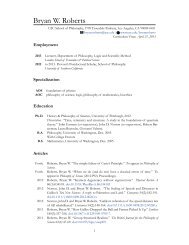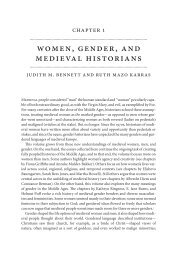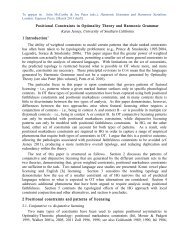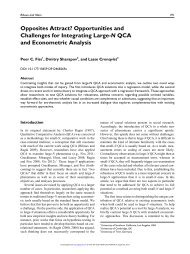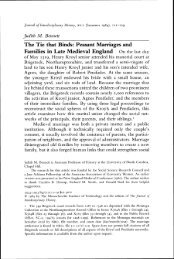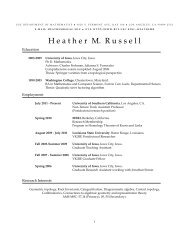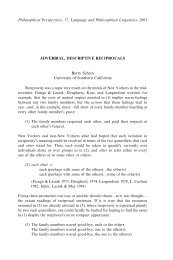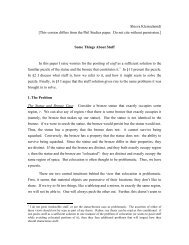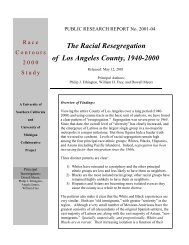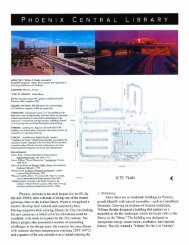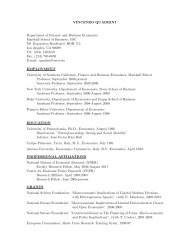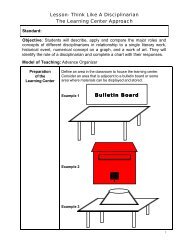INDIVIDUAL DIFFERENCES IN THE ARTICULATED THOUGHTS ...
INDIVIDUAL DIFFERENCES IN THE ARTICULATED THOUGHTS ...
INDIVIDUAL DIFFERENCES IN THE ARTICULATED THOUGHTS ...
Create successful ePaper yourself
Turn your PDF publications into a flip-book with our unique Google optimized e-Paper software.
<strong><strong>IN</strong>DIVIDUAL</strong> <strong>DIFFERENCES</strong> <strong>IN</strong> <strong>THE</strong><br />
<strong>ARTICULATED</strong> <strong>THOUGHTS</strong> AND PSYCHOLOGICAL<br />
IMPACT OF SIMULATED RACISM ENCOUNTERS<br />
Jennifer L. Best, M.A. and<br />
Gerald C. Davison, Ph.D.<br />
University of Southern California<br />
ABSTRACT<br />
The Articulated Thoughts in Simulated Situations<br />
(ATSS) paradigm was utilized to explore the affective<br />
experiences and coping intentions in a group of female<br />
college students of African American heritage while they<br />
imaginally encountered different types of racism stressors.<br />
The links among attitudes about racial identity, hardiness<br />
beliefs and aspects of participants' ATSS (i.e. articulated<br />
affect and coping intentions) and post-ATSS psychological<br />
functioning (i.e. positive and negative affect, self-esteem,<br />
interest, preparedness, thoughts) were examined. Across<br />
racism stressors, problem-focused coping articulations were<br />
negatively correlated with expressions of negative affect.<br />
Transformational coping cognitions were positively related<br />
to expressions of positive affect during the vignettes. In<br />
addition, while earlier stage racial identity attitudes were<br />
positively associated with behavioral disengagement<br />
intentions expressed during the racism scenarios, hardy<br />
attitudes were found to be negatively related to this type of<br />
coping response. Later stage racial identity attitudes (i.e.<br />
internalization) and hardiness were also positively related to<br />
more adaptive psychological outcome indicators (e.g. selfesteem,<br />
positive affect, interest) reported in the immediate<br />
aftermath of the simulated racism encounters. These<br />
findings have important implications for understanding the<br />
relation of health-promoting individual difference factors to<br />
affect and coping in the process of and following<br />
encounters of racism-related stressors.<br />
BACKGROUND<br />
> Racist events have been cited as significant<br />
psychosocial stressors linked to risks to both mental and<br />
physical wellness for people of color (Clark et al., 1999;<br />
Harrell et al., 1998).<br />
> There is a dearth of empirical work<br />
relating individual differences to both the psychological<br />
experiences of African Americans as they cope with racerelated<br />
stressors and in the aftermath of coping with racist<br />
events.<br />
> Stages of racial identity attitudes are<br />
culturally-specific individual difference factors related to<br />
aspects of psychological health and adaptiveness among<br />
African Americans (Cross, 1971, 1991; Helms & Parham,<br />
1985; Wilson & Constantine, 1999).<br />
> Hardiness has been found to be an important<br />
health-related personality factor in the stress and wellness<br />
literature linked to adaptive forms of coping (Maddi &<br />
Hightower, 1999) and to psychological adjustment<br />
following significant psychosocial stressors (King et al.,<br />
1998).<br />
> The Articulated Thoughts in Simulated<br />
Situations (ATSS) paradigm is a useful think-aloud<br />
approach for investigating cognition and emotion expressed<br />
during imaginal interpersonal scenarios as they unfold<br />
(Davison, Robins, & Johnson, 1983; Davison, Vogel, &<br />
Coffman, 1997).<br />
SPECIFIC AIMS<br />
â To examine the psychological experiences of<br />
African American college-aged women both during (i.e.<br />
affect and coping) as well as following (e.g. affect, selfesteem)<br />
imagined racism stressors utilizing a novel, thinkaloud<br />
approach<br />
> To demonstrate the relation between<br />
articulated affect and coping intentions while imaginally<br />
experiencing interpersonal situations involving racism<br />
> To explore the links of health-related<br />
individual difference factors such as stage of racial identity<br />
attitudes and hardiness to the psychological experiences of<br />
participants both during and immediately after imagining<br />
simulated racism stressors<br />
HYPO<strong>THE</strong>SES<br />
> Earlier stage racial identity attitudes (e.g. preencounter)<br />
would be negatively associated with hardiness<br />
while the opposite pattern of associations was anticipated<br />
for later stage racial identity attitudes (e.g. internalization)<br />
and hardy beliefs.<br />
> Hardiness and later stage racial identity attitudes<br />
would be positively related to positive affect expressions,<br />
problem-focused and transformational coping articulations<br />
verbalized during the ATSS racism vignettes.<br />
> Hardiness and later stage racial identity attitudes<br />
would be negatively associated with negative affect<br />
expressions, avoidant and behavioral disengagement coping<br />
articulations verbalized during the ATSS racism stressors.<br />
> Earlier stage racial identity attitudes were<br />
anticipated to negatively covary with post-ATSS indices of<br />
positive affect, self-esteem, preparedness and interest.<br />
> Hardiness and later stage racial identity attitudes<br />
were predicted to positively covary with post-ATSS<br />
measures of positive affect, self-esteem, preparedness and<br />
interest.<br />
METHOD<br />
• Participants: 64 African American women (mean<br />
age = 19)<br />
â Self-report Measures:<br />
o Demographic Questionnaire<br />
o Racial Identity Attitudes Scale-Black<br />
version (RIAS-B; Parham & Helms,<br />
1985)<br />
o Personal Views Survey-Ill R (PVS-IIIR;<br />
The Hardiness Institute, 2001)
RESULTS<br />
2<br />
o Positive and Negative Affect Schedule > Hardiness was positively associated with later<br />
(PANAS; Watson, Clark & Tellegen,<br />
stage racial identity attitudes (r = .33) and negatively<br />
1988)<br />
associated with earlier stage racial identity attitudes (r =<br />
o Rosenberg Self-esteem Scale (RSE; -.53).<br />
Rosenberg, 1965) > Hardiness positively covaried with positive affect<br />
o COPE Inventory (COPE; Carver, Scheier (r = .38) and negatively covaried with behavioral<br />
& Weintraub, 1989)<br />
disengagement articulated during the ATSS racism<br />
o Post-study Questionnaire<br />
scenarios (r = -.36).<br />
> Pre-encounter attitudes were positively related to<br />
â ATSS Racism Stressors:<br />
behavioral disengagement (r = .35) and immersion attitudes<br />
o Individual (Mall)<br />
were marginally positively associated with emotion-focused<br />
o Collective/hate crime<br />
coping articulations (r = .23).<br />
(Neo-Nazi)<br />
â Behavioral disengagement negatively covaried<br />
o Intra-ethnic (Sorority)<br />
with post-study preparedness beliefs (r = -.29).<br />
> Hardiness was positively associated with post-<br />
ATSS racism stressor self-reported positive affect (r = .27),<br />
preparedness beliefs (r = .27) and self-esteem (r = .45).<br />
â Earlier stage racial identity attitudes were<br />
negatively related to post-ATSS positive affect (r = -.35),<br />
preparedness beliefs (r = -.50) and self-esteem (r = -.38).<br />
> Later stage racial identity attitudes positively<br />
covaried with post-ATSS positive affect (r = .35), selfesteem<br />
(r = .28) and interest (r = .42).<br />
> Procedure (within-subjects/repeated measures<br />
design):<br />
o Fixed order battery of self-report<br />
questionnaires (RIAS-B, PVS-IIIR,<br />
PANAS-I, RSE-I)<br />
o ATSS racism vignettes (via audiotape,<br />
counter-balanced)<br />
o PANAS-lI, RSE-II, COPE and Post-study<br />
Questionnaire (thoughts, preparedness,<br />
interest)<br />
o Participant debriefing<br />
o Participants either received course credit<br />
or S10 for their time<br />
> ATSS Coding Scheme: (collapsing across<br />
conditions)<br />
o Articulated Affect Expressions:<br />
Anger, Sadness, Fear, Positive Affect<br />
o Articulated Coping Intentions:<br />
Problem-focused, Emotion-focused,<br />
Avoidant, Behavioral<br />
Disengagement, Transformational<br />
> Preliminary Statistical Analyses:<br />
o Inter-rater reliability intra-class<br />
correlation coefficients for ATSS<br />
coding variables<br />
o Pearson product moment bivariate<br />
correlations<br />
Across the racism vignettes, articulated problemfocused<br />
coping intentions were negatively related to both<br />
anger expressions (r = -.23) and to fear expressions<br />
(r = -.31).<br />
â Articulated problem-focused coping was also<br />
significantly positively related to transformational coping<br />
cognitions (r = .29) and negatively associated with<br />
behavioral disengagement intentions (r = -.34).<br />
> Within the racism scenarios, articulated<br />
transformational coping cognitions were positively related<br />
to positive affect expressions (r = .36).<br />
CONCLUSIONS AND IMPLICATIONS<br />
> The relation of coping to the process of managing<br />
negative and positive affect while encountering racism<br />
stressors<br />
> Positive affect and transformational coping as<br />
significant factors related to post-racism stressor benefit- or<br />
meaning-finding that should be further explored<br />
â The relation of culturally-specific and general<br />
health-related cognitive individual difference factors<br />
> Hardiness and stages of racial identity attitudes as<br />
important variables to consider in how people of color cope<br />
with, react to and adapt to racism-related interpersonal<br />
stressors that could have potential long-term implications<br />
for buffering against the development of psychological<br />
and/or physical illness<br />
> The utility of the ATSS think-aloud approach in<br />
capturing the cognitive and affective experiences of African<br />
American women as they confronted racism-related<br />
stressors that builds upon the questionnaire-based findings<br />
within this area of research<br />
FOR FUR<strong>THE</strong>R READ<strong>IN</strong>G<br />
Cross, W. E. (1991). Shades of black: Diversity in<br />
African American identity. Philadelphia: Temple University<br />
Press.<br />
Davison, G. C., Vogel, R. S., & Coffman, S. G.<br />
(1997). Think aloud approaches to cognitive assessment<br />
and the articulated thoughts in simulated situations<br />
paradigm. Journal of Consulting and Clinical Psychology,<br />
65, 950-958.<br />
t
Helms, J. E. (1990). Black and white racial<br />
identity: Theory, research and practice. New York:<br />
Greenwood Press.<br />
Maddi, S. R. (1999). The personality construct of<br />
hardiness: Effects on experiencing, coping, and strain.<br />
Consulting Psychology Journal: Practice and Research, 51,<br />
83-94.<br />
Maddi, S. R. & Hightower, M. (1999). Hardiness<br />
and optimism as expressed in coping patterns. Consulting<br />
Psychology Journal, 51, 95-105.<br />
Plummer, D. L. & Slane, S. (1996). Patterns of<br />
coping in racially stressful situations. Journal of Black<br />
Psychology, 22, 302-315.<br />
Utsey, S. O. & Ponterotto, J. G. (2000). Racial<br />
discrimination, coping, life satisfaction, and self-esteem<br />
among African Americans. Journal of Counseling and<br />
Development, 78, 72-80.<br />
CONTACT PERSON FOR FUR<strong>THE</strong>R <strong>IN</strong>FORMATION<br />
REGARD<strong>IN</strong>G THIS STUDY<br />
Jennifer L. Best, M. A.<br />
University of Southern California<br />
Department of Psychology<br />
SGM 501<br />
Los Angeles, CA 90089<br />
Email: jbest@usc.edu<br />
3



